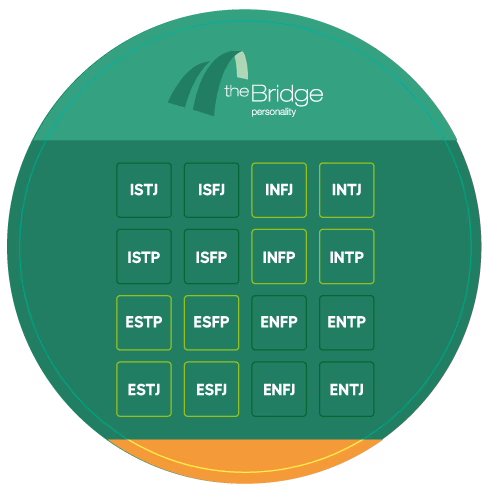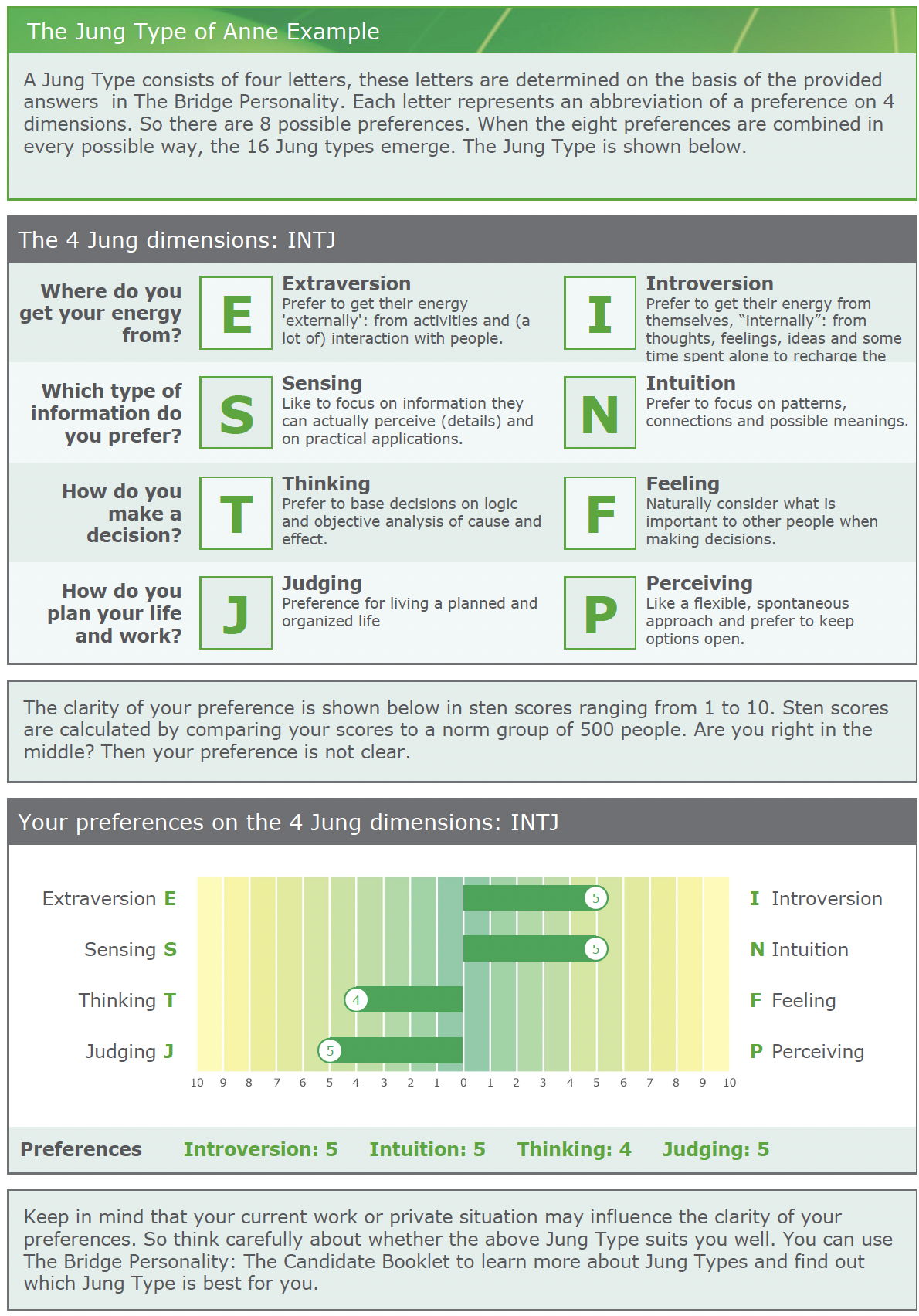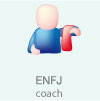The 16 Jung Types
The 16 Jung Types (also known as Myers-Briggs Type Indicator® Types or MBTI® Types) are based on the personality model of the Swiss psychiatrist Carl Jung (1875-1961). This model is popular in psychology and is often used to map behavioral preferences. The Bridge Personality is a well-known and widely used personality test utilized to determine the Jung Type of an employee or candidate. You can order this personality test individually (per participant) or administer it via your own account on The Bridge Assessment Platform by TestGroup.
What are the 16 Jung Types?
The 16 Jung Types are based on the research by Carl Gustav Jung, a famous Swiss psychiatrist who developed the Jungian Psychology. This is one of the world's most used and well respected models on personality and behavior. Personality tests (such as The Bridge Personality) that use the 16 Jung Types are widely used by organizations for assessments, team building, coaching and development of employees.
How do you use the 16 Jung Types in organizations?
Using the 16 Jung Types, a company or organization can gain more insight into its employees and their preferences. This model provides valuable answers to questions such as: In which work environment do employees thrive best, and why? How do they react to stressful situations or changes within the organization? How do they organize their work and personal life?
By applying the 16 Jung Types, you can better understand the needs and motivations of your employees. This can assist in creating a work environment where they can perform optimally and feel engaged. Additionally, it can aid in assembling teams that are complementary. This way, you can fully utilize the potential of your employees and create a productive and harmonious work environment.
How to order a 16 Personality Test
Ordering a 16 Personality Test from TestGroup is flexible and easy. For occasional use, you can choose a single test per candidate—ideal for specific hiring or team reviews. For companies with frequent assessment needs, an unlimited access account lets you run as many tests as you want.
Determining the Jung Type reliably with The Bridge Personality
For over 15 years, The Bridge Personality has been the most uand reliable Jung Personality Test by companies and organizations. This test provides valuable insights into the 16 Jung Types, enabling organizations to make effective decisions in the areas of staff development, career guidance, and team formation.
The 4 Jung Dimensions
The Bridge Personality measures the 16 Jung Types by mapping a candidate's preferences across 4 Jungian dimensions:
1. Extraversion or Introversion: Where do you direct your attention?
Are you mainly focused on the outside world or on your own thoughts? Individuals with a preference for Extraversion enjoy working with others and develop initiatives together with others. People with a preference for Introversion appreciate a quiet work environment and develop ideas when they are alone.
2. Sensing or Intuition: How do you take in information?
Are you primarily interested in facts, or are you intrigued by what might be possible? A characteristic of people with a preference for Sensing is that they prefer to work step by step on tasks for which they already know the procedure. People with a preference for Intuition, on the other hand, enjoy taking on new, creative projects.
3. Thinking or Feeling: How do you make decisions?
People with a preference for Thinking make decisions based on logical and objective reasoning. Individuals with a preference for Feeling make decisions based on personal ideals. Those with a preference for Feeling can also argue their decision logically, but they do so only after consulting their personal values.
4. Judging or Perceiving: How do you organize the world around you?
Individuals with a preference for Judging prefer to live in a structured manner. People with a preference for Perceiving like to live more flexibly. Those with a preference for Judging prefer to work according to a plan and focus on what needs to be done. Individuals with a preference for Perceiving enjoy change, are open to new experiences, and feel constrained by structure.
The combination of these four preferences forms the 16 Jung Types
With The Bridge Personality, you measure the 16 Jung Types in a scientifically-responsible manner.

Example of the 16 Jung Type report
You can view a sample report of The Bridge Personality 16 Jung Type report here. Initially, this report displays the scores on the 34 Big Five competencies. These competencies can be used for the selection of virtually any job profile. Subsequently, the participant's Jung Type is presented. On the last page of the report, you will find the scores on 8 commonly-used competencies.
Example page from the report

Short personality tests that measure the 16 Jung Types
Most personality questionnaires that determine Jung Types are very short (often no more than 40 questions) or available for free on the internet. Short questionnaires such as the Myers-Briggs Type Indicator (MBTI) or Insights Discovery can therefore be easily manipulated by candidates. A candidate can manipulate these tests so that any Jung Type or personality color can appear in the report, hence, making them end up being not very reliable.
Measuring the 16 Jung Types with a reliable and valid personality questionnaire
The Bridge Personality is a valid and reliable personality test that determines the 16 Jung Types based on 241 questions. Therefore, it is a very comprehensive personality test. In addition, this test cannot be manipulated by candidates because it is 'dynamic.'
Furthermore, The Bridge Personality also uses Normative-Ipsative Split Technology®. Normative-Ipsative Splits are indicators that can signal the extent of guided answering behavior at the level of a personality dimension (character trait). This way, this test is capable of mapping the Jung Type of your candidate very reliably.
The Bridge Personality has been independently evaluated as one of the most reliable ways to measure Jung Types. In the report, you receive information on leadership, communication, stress management, and conflict resolution for each Jung Type.
Order tests from TestGroup: single test purchase or a subscription.
At TestGroup, you have simple options for test administration: individual purchases or a subscription.
What are the 16 Jung Types?
The 16 Jung Types are made up of four dichotomies that characterize distinct personality facets—how individuals prefer to energize (Extraversion (E) vs. Introversion (I)), gather information (Sensing (S) vs. Intuition (N)), make decisions (Thinking (T) vs. Feeling (F)), and interact with the world (Judging (J) vs. Perceiving (P)). Typically, individuals resonate more with one tendency within each dichotomy, which aligns with their intrinsic method of operation and where they feel most authentic, regardless of the roles they assume in their daily lives. Combining the initials of each preferred tendency yields 16 unique personality profiles, each with its own set of traits.
ISTJ
Reserved and earnest, ISTJs achieve success through diligence and reliability. They're pragmatic, grounded, and accountable, making decisions based on logic and steadily pursuing their goals despite interruptions. They delight in organization, bringing order to their work, homes, and lives. They hold fast to traditions and are fiercely loyal.
ISFJ
ISFJs are quiet, amiable, dutiful, and meticulous. They're steadfast in fulfilling their duties with precision and accuracy. Loyalty and thoughtfulness are their hallmarks, as they remember the fine details about those they care for and are sensitive to their feelings. They aim to cultivate a peaceful and orderly environment both at work and at home.
INFJ
INFJs search for deeper meanings and connections in their surroundings, relationships, and belongings. They are keen observers of what drives people, often showing insight into others' motivations. With a strong adherence to their values, they form clear visions for the common welfare and are purposeful and definitive in achieving their ideals.
INTJ
INTJs possess innovative minds with a strong drive to actualize their ideas and reach their objectives. They quickly discern patterns and devise extensive, explanatory visions. Once dedicated, they strategically plan and execute their tasks. They are independent, critical thinkers with lofty standards for competence and achievement, both for themselves and others.
ISTP
ISTPs are adaptable and reserved, often acting as keen observers until they identify a problem, then swiftly move to solve it. They analyze to understand functionalities and efficiently sift through data to pinpoint problem cores. Fascinated by cause and effect, they apply logical reasoning to facts, valuing efficiency.
ISFP
Gentle and approachable, ISFPs are sensitive and kind-hearted. They savor the present moment and their immediate environment. Preferring autonomy, they work at their own pace. Devoted to their values and to significant individuals in their lives, they shy away from conflict and do not impose their beliefs on others.
INFP
INFPs are idealists, true to their principles and to those they cherish. They aspire to live in harmony with their values. Naturally curious, they quickly spot potential and inspire change. They seek to understand and empower people, being flexible and open-minded, except when their core values are at stake.
ESTP
ESTPs are pragmatic and adaptable, with a focus on immediate, tangible outcomes. Impatient with abstract theories, they thrive on action and resolving challenges promptly. Living in the moment, they relish active, shared experiences and enjoy life's material comforts and styles. They learn most effectively by doing.
ESFP
ESFPs are sociable, welcoming, and accepting, embodying a zest for life, people, and comforts. They excel in collaborative efforts and apply practical sense to make tasks enjoyable. They are adaptable, thriving on spontaneity and embracing new environments and individuals. Hands-on learning with others is their preferred way of acquiring new skills.
ENFP
ENFPs exude enthusiastic warmth and creativity, viewing life as a realm of possibilities. They make connections quickly, confidently acting on identified patterns. They crave affirmation and are generous with their encouragement and support. They are spontaneous, often improvising effectively with verbal agility.
ENTP
ENTPs are inventive, stimulating, and direct, flourishing when tackling novel and complex problems. They're adept at brainstorming and critically assessing conceptual ideas; skilled in understanding people. Disenchanted by routine, they're drawn to a diversity of interests and continually seek new pursuits.
ESTJ
ESTJs are down-to-earth, decisive, and no-nonsense. They are quick to decide and take action to complete tasks effectively and efficiently, paying attention to details. They adhere to a clear logical order, expecting the same of others, and are assertive in executing their plans.
ESFJ
ESFJs are warm and conscientious, seeking harmony and cooperation in their surroundings. They are determined to complete tasks accurately and punctually. Noticing the needs of others in daily life, they strive to meet them and value recognition for their contributions and personal qualities.
ENFJ
ENFJs are empathetic, supportive, and responsible, keenly attuned to the emotions and motivations of others. They see the potential in people and encourage growth, often playing a pivotal role in group and individual development. They appreciate feedback, are sociable, and offer inspirational leadership.
ENTJ
ENTJs are outspoken and decisive leaders, quickly identifying and rectifying inefficient systems and processes. They relish strategic planning and goal-setting, often possessing a wealth of knowledge that they enjoy sharing. They are assertive in presenting their thoughts and ideas.
Combining the 16 Jung Types with the 4-color personality model
Understanding people at work can be made easier by combining Carl Jung's 16 personality types with The Bridge Personality's 4-color personality model. Jung's system breaks down personalities into 16 types, giving us a detailed look at how different people think and work. The 4-color model simplifies this by grouping traits into four colors: Red personalities for action-driven people, Blue personalities for those who love details, Green personalities for team players who value harmony, and Yellow personalities for creative thinkers. This combination helps make sense of complex personality theories in a way that's easy to use in companies and organizations.
Practical uses in teams and leadership
By matching Jung's personality types with the four colors, companies can get a clear picture of how their teams work together. For instance, a person with an INTJ type might show traits of the Red personality color, being good at making decisions, while an ISFJ might lean towards the Green personality color, showing caring and supportive behavior. This method is really useful for improving teamwork and leadership. It helps managers understand their team members better and can guide them in how to communicate and work together more effectively.
In the workplace, understanding these personality types and 4 colors can make a big difference. It can help teams work better together, for instance with the team workshop: do-it-yourself kit. This workshop helps to improve how people talk to each other, and create a more welcoming environment. Leaders can use this knowledge to manage their teams better, by knowing who works best in what role and how to support each person's growth. In schools and training programs, this approach helps students and teachers understand each other better, making learning and working together more effective. Overall, combining Jung's detailed types with the straightforward 4-color model offers a powerful tool for better understanding and collaboration in the workplace.
Understanding the different personality assessments: Big Five, 16 Personality Types, and 4-color Test
Big Five Personality Test: This framework veers away from categorizing individuals into distinct types. Instead, it evaluates five key personality domains: Openness, Conscientiousness, Agreeableness, Extraversion, and Emotional Stability (opposite to Neuroticism). These are seen as universal traits in humans, influencing thoughts, emotions, and behaviors. Rather than assigning a type, the Big Five offers a percentage score for each trait, indicating where an individual falls on the spectrum of each domain.
16 Personality Test: In contrast, this test categorizes personalities into one of 16 types, based on core traits across four dichotomies: Introversion vs. Extraversion, Intuition vs. Sensing, Feeling vs. Thinking, and Perceiving vs. Judging. While it also uses a spectrum approach, it ultimately assigns a four-letter code representing one of the Jungian Types. This test acknowledges the fluidity of traits, indicating that tendencies like 'Feeling' or 'Intuition' don't entirely exclude 'Thinking' or 'Sensing' behaviors in certain situations.
4-Color Personality Test: Commonly used in business environments for team-building, this test assigns one of four colors (Blue, Green, Red, Yellow) to represent distinct personality styles. Each color signifies specific behaviors and characteristics (e.g., Red for decisiveness, Blue for detail-orientation). Though less complex than the Big Five or 16 Personality Types, the 4-color test is favored for its simplicity and effectiveness in initial team assessments.
In summary, while the Big Five and 16 Personality tests offer a more nuanced understanding of individual traits and tendencies, the 4-color test provides a straightforward approach for team contexts. Each tool has its unique strengths, catering to different needs in the realm of personality assessment.
The 16 Jung Types: Type Table
In the table below, you will find an overview of the 16 Jung Types. Click on a Jung Type to read its description.
















16 Jung Types: example report
The 16 Jung Types report provides scores on 34 competencies, determines the candidate's Jung Type, and gives scores on 8 general competencies. This way, you have a complete overview of your candidate's personality.
Video: 16 Jung Type Team Workshop
What objectives are you aiming for with your team? Which aspects require refinement, and what areas could benefit from a boost in motivation? The Bridge Personality team workshop is designed to provide teams with the clarity needed to enhance performance. Within the team workshop's do-it-yourself bundle, you'll receive every essential tool to facilitate your personalized team session. This workshop utilizes a tailored Bridge Personality report for each individual and a comprehensive team report for collective insights. The do-it-yourself package comes complete with all necessary materials, enabling you to initiate your team workshop immediately.